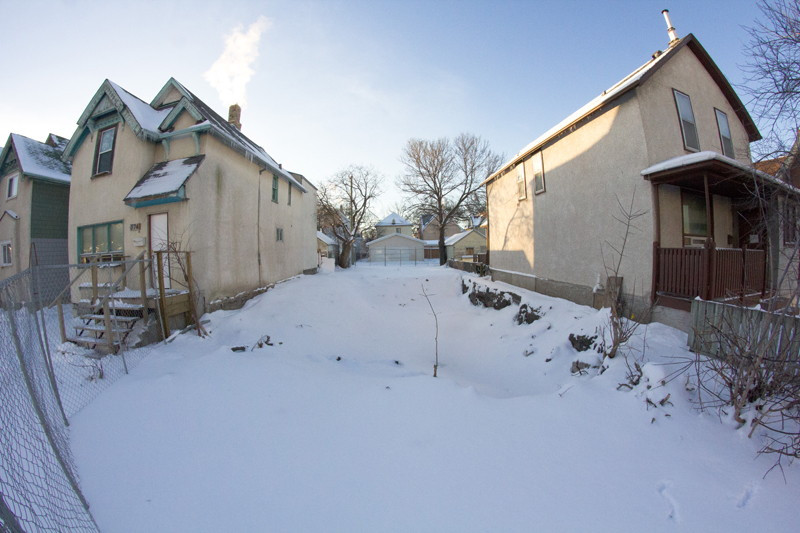Boarded-up houses may soon be a thing of the past in Winnipeg’s downtown
City bylaw changes help community housing organizations
The Spence Neighbourhood Association (SNA) is reducing the number of derelict buildings in Winnipeg’s downtown – eight homes at a time.
In the past six months, eight boarded-up houses have been or are in the process of being demolished in the Spence area.
According to Don Miedema, housing coordinator for the SNA, the plan is to build houses on the four sites and sell them at affordable rates for area residents.
These houses will meet R-2000 industry standards for energy efficiency, indoor air tightness quality and environmental responsibility in home construction, notes Miedema.
“Services like sewer and water systems are already in place when we build houses on residential properties downtown,” Miedema said. “With new developments at the edges of the city like Waverley West, however, this infrastructure has to be put in.”
Four houses owned by the Lions Club in the 300 block of Sherbrook Street have also come down. Community partners, like the SNA, are working with the Lions Club to help determine the exact type of housing that needs to go in those now empty properties.
Miedema notes that some private investors are considering building four – or six-plexes in the neighbourhood as well.
“Sherbrook is already a street with multi-family housing, so it is an ideal place for that type of investment,” Miedema said.
Frank Zappia, owner of Zappia Group Realty, notes that such investments are triggered by the work of organizations like the SNA and the Housing Opportunity Partnership, a West End non-profit housing revitalization initiative.
“As we buy up and repair boarded houses, more private investors are doing it as well,” said Zappia. “That’s the success: when private investment comes in.”
Residents, like George Miller, caretaker of a multi-unit house on Spence Street for seven years, have noticed changes in the neighbourhood as boarded-up houses are converted or demolished.
“People are moving here, they’re buying houses and they’re taking pride in their houses,” Miller said.
RECENT CITY BYLAW CHANGES SUPPORT HOUSING ACTIONS
The City of Winnipeg has recently changed bylaws for vacant and derelict buildings, with the goal of reducing the number of boarded-up houses in the downtown area.
This is thanks, in part, to urging from housing organizations like the SNA, the Daniel McIntyre/St. Matthews Community Association and the Winnipeg Housing Rehabilitation Corporation (WHRC), notes Miedema.
The previous Vacant Buildings Bylaw has been split into two separate bylaws, says Rob MacKinnon, a program coordinator in the city’s bylaw enforcement division. The Vacant Building Bylaw, which came into effect July 2010, makes it more costly for building owners to board up houses.
Getting a boarded building permit used to cost ten dollars, notes Miedema, and the onus was on the owner to get that permit.
Under the new Vacant Buildings Bylaw, the first boarded building permit now costs $2,000, which is 75 per cent refundable if the building is fixed up before the permit runs out.
Further, if a city enforcement officer finds a boarded building with no permit, they can issue an order for the owner to either get the boarded building permit or fix the building up to standard within 14 days.
“When boarded building permits were only $10, it didn’t motivate government to go after these building owners,” Miedema said. “The new vacant building bylaw has more teeth, making it easier for the city to enforce it.”
The intent of the new vacant building bylaw is two-fold, MacKinnon says.
“ As we buy up and repair boarded houses, we see more private investors doing it as well ... That’s the success: when private investment comes in.
Frank Zappia, owner, Zappia Group Realty
“We wanted to ensure that firefighters were safe when entering vacant buildings, but we also wanted a comprehensive approach to eliminating illegal activities that sometimes goes on in vacant buildings,” he said.
The second bylaw, the Taking Title to Vacant and Derelict Buildings Bylaw, is currently under review, says Garry Solkoski, acting manager of development and inspections with the City of Winnipeg.
This new bylaw will allow the city to expedite their possession of buildings that owners do not fix up, says Miedema.
Solkoski hopes the bylaw will be passed by early December, but it depends on how long it takes to go through readings at city council.
By updating the standards on vacant and derelict buildings and working with organizations like the SNA, adds MacKinnon, the city hopes to improve the quality of life in the downtown area.
Some neighbourhoods, like West Broadway, have managed to drastically reduce the number of boarded-up buildings.
“West Broadway has one boarded-up 11 unit apartment building at 133 Sherbrook St.,” said Brian Grant, housing development coordinator for the West Broadway Development Corporation.
MacKinnon adds that the city has only been recording the number of boarded-up buildings since May 2010, but that the number has gone down since then.
“The clearest sign of this is the number of demolitions of properties not deemed to be rehabilitated,” MacKinnon said. “These demolition numbers have gone up, meaning that there’s been a decrease in the number of vacant and boarded-up buildings.”
Published in Volume 65, Number 13 of The Uniter (November 25, 2010)







